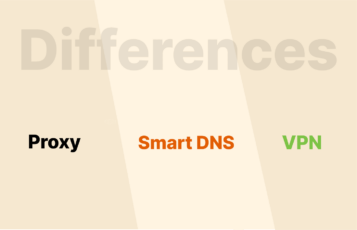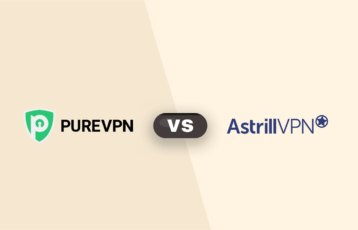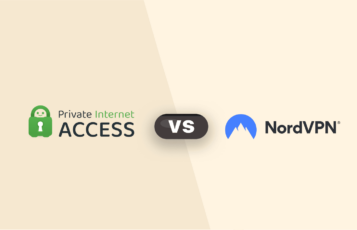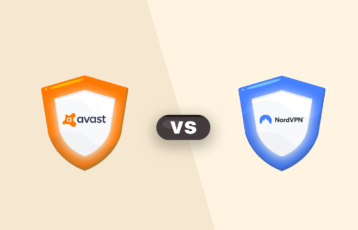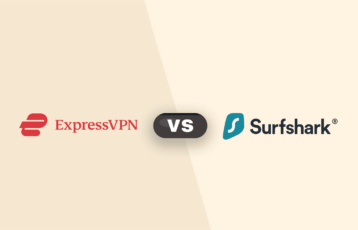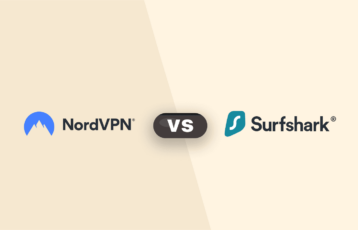ExpressVPN is probably the biggest name in the VPN verse today. And PIA is nearly there, too. ExpressVPN’s reputation comes from being at the top of the industry for an extended period. PIA is known because it owns the largest server network in the business. But how much fire is behind all this smoke?
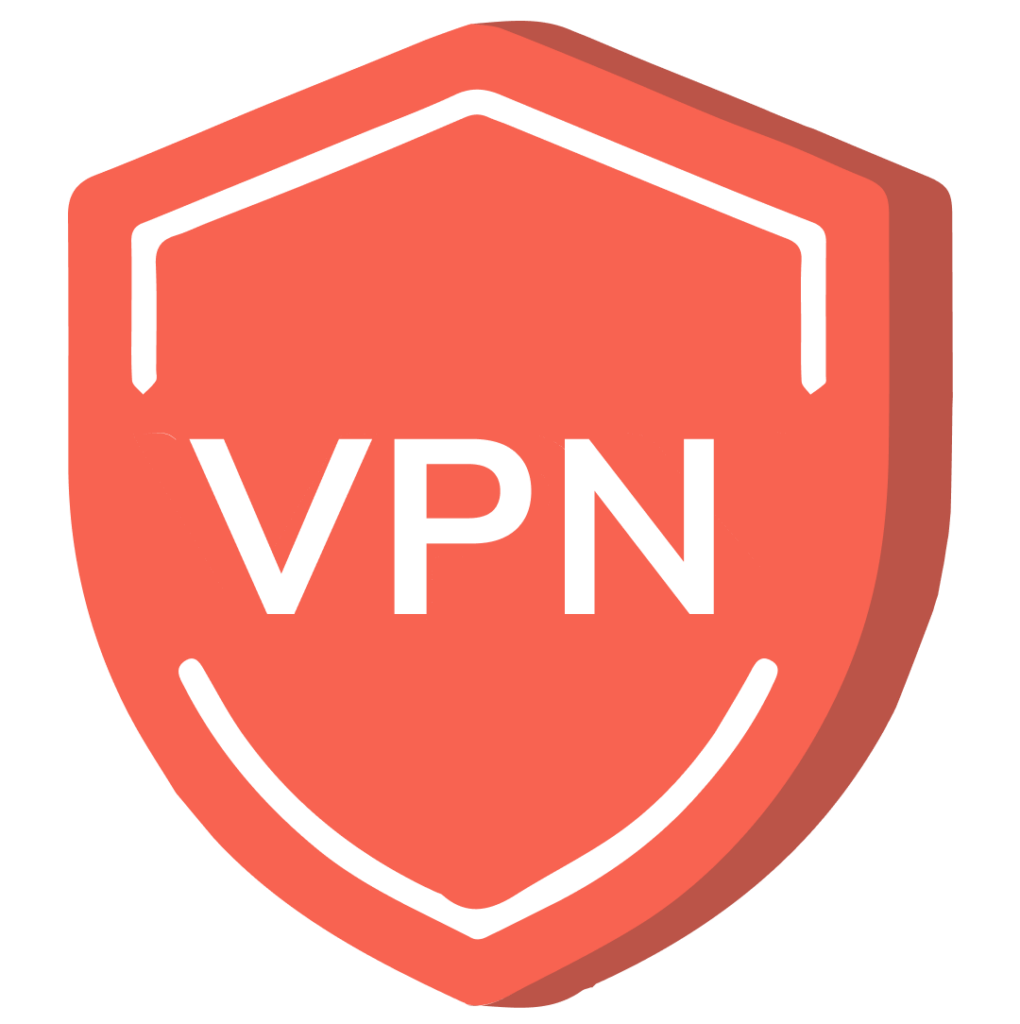
We endeavoured to test both VPNs head to head to determine any significant differences, even though they share the same parent company, Kape Technologies Ltd. The result is the article you’re reading.
PIA and ExpressVPN: The general outlook
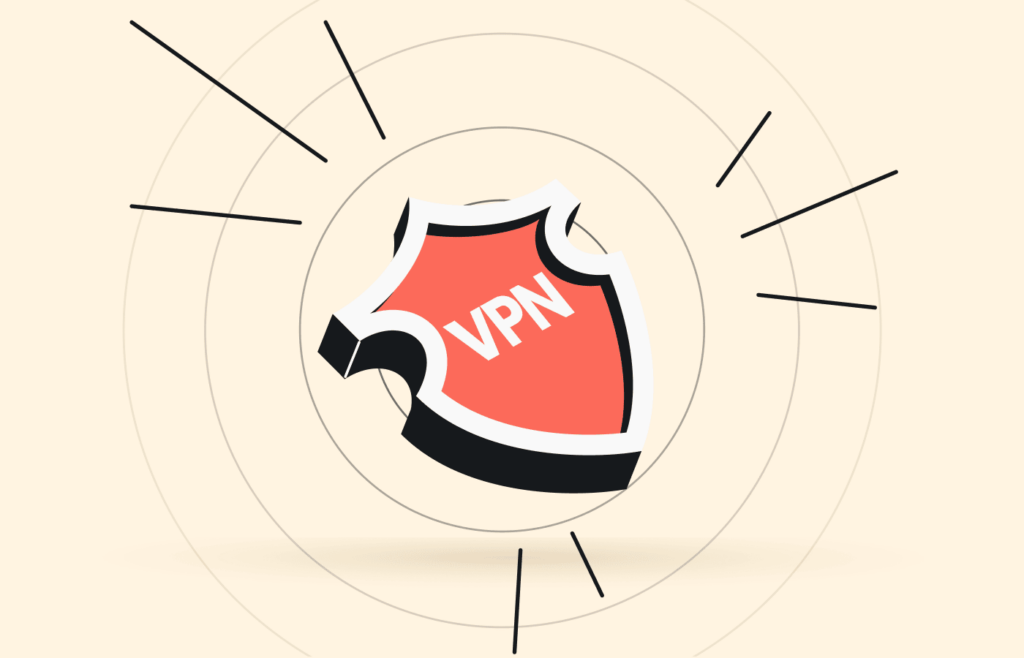
We start with the server network in each vendor. For example, PIA’s network is the largest in the market, with over 30,000 servers in 91 countries; ExpressVPN has over 3,000 servers in 107 countries. So can ExpressVPN hold a candle to a VPN with ten times at many servers? Well, numbers aren’t everything. ExpressVPN’s servers have advantages other than strength in numbers.
Both providers stick to a strict no-logs policy.
PIA offers WireGuard, OpenVPN, and IKEv2/IPsec in the VPN protocols. ExpressVPN’s offer is similar. However, it also has WireGuard, in a proprietary implementation it calls Lightway, and the additional L2TP/IPsec tunnel available.
We know that PIA can unblock Netflix, YouTube, and Hulu. ExpressVPN unblocks those, plus Disney +, BBC iPlayer, and more. So basically, any video streaming that can be unlocked with a VPN gets unlocked with ExpressVPN.
The software provided by both VPNs includes every critical operating system and platform (Linux, macOS, Windows, Android, and iOS). In addition, they both offer browser plugins for Mozilla Firefox and Google Chrome. But, then, only ExpressVPN supports Microsoft Edge, and only PIA supports Opera. However, the plugins are not directly comparable because they are developed as different concepts –more on later.
One PIA account is suitable for ten concurrent connections, while ExpressVPN will support five only.
Both websites offer similar services in the customer service department, except that ExpressVPN has a good FAQ.
Read also: Private Internet Access vs. NordVPN
Connections speeds

ExpressVPN’s excellent reputation includes being one of the fastest VPNs out there. It comes courtesy of Lightway, ExpressVPN’s implementation of the WireGuard VPN tunneling protocol, which is the most efficient and modern. However, there are other reasons to expect high speeds from any server in this network, regardless of the protocol.
PIA also has a WireGuard option (although not as customized and developed as Lightway). We could not test PIA’s WireGuard protocol this time because it’s unavailable for Windows users. This is unfortunate. It’s hard for us to understand why the fastest protocol is unavailable for the most prominent user pool, but that’s how it is.
Thus, direct tests were out of the question for this protocol, which is a great shame. This lack of foresight on PIA’s part would be enough to give the category to ExpressVPN even without testing because it’s evident that the other protocols in either VPN can’t match WireGuard’s performance. But we will carry on as usual, anyway.
OpenVPN TCP
We started with OpenVPN, the industry’s golden standard in both VPNs. It’s not the fastest tunnel around, but it’s the one that has passed every audit ever made. It’s secure, reliable, and transparent.
So here’s what we found: ExpressVPN’s OpenVPN option allowed us to keep precisely one-third of our upload speeds and a slightly lower portion of our upload speeds (32%). The corresponding numbers with PIA were 12.67 and 13.67%. So, ExpressVPN is almost three times as fast as PIA on downloads and about twice as fast on uploads.
Of course, the kind reader should never forget that internet speeds are a tricky and sensitive thing that relies on too many external factors. So you shouldn’t be surprised if your experience varies slightly. Moreover, if you get lucky in picking a server that’s particularly ready to serve you correctly, you could find performance peaks. But you can’t expect to win the lottery whenever you buy a ticket. However, the overall situation is evident in the OpenVPN camp, and ExpressVPN wins it hands down.
Open UDP
When we tried the OpenVPN UDP version, ExpressVPN gave us 55% of our baseline download speed and 36.67% for uploads. PIA, again, gave us 12.67% and 13.67%. So it’s the same story, except that ExpressVPN comes ahead even further.
The ExpressVPN server network wins the speed battle by quite a bit.
Unblocking Netflix and other streaming video services
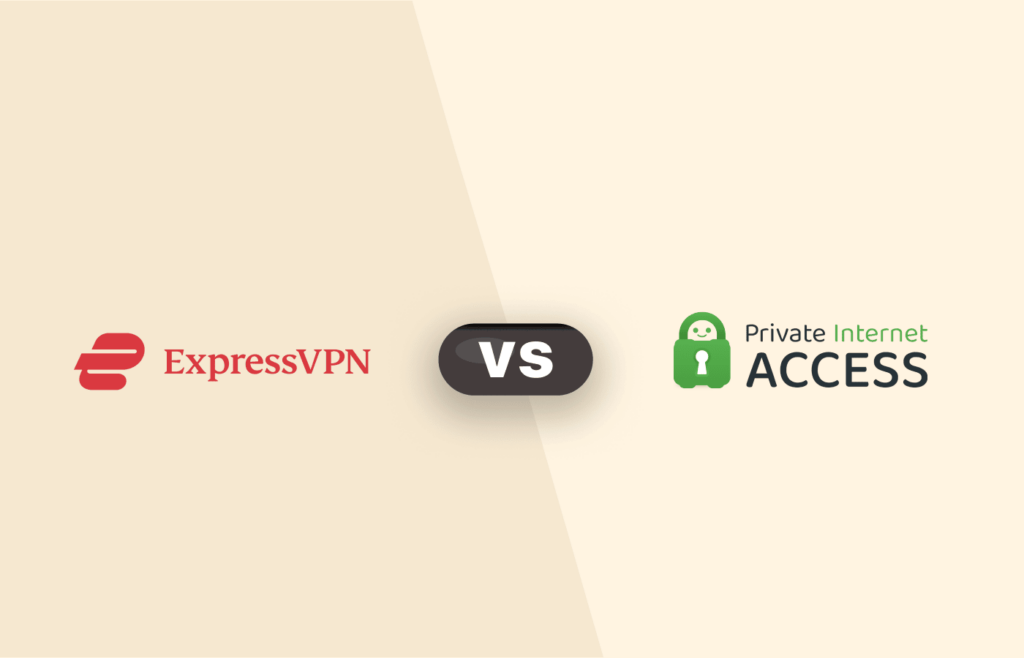
VPNs came to life to provide the most paranoid and tech-savvy geeks peace of mind. Then Assange happened. And Snowden. Furthermore, the Covid-19 pandemic came along. Those three events changed the internet forever. The result is that, in our current times, the primary use case for VPNs has little to do with security and everything to do with accessing geo-blocked content (Netflix, for instance).
The video streaming giants of the world are aware of this trend, so they spend a lot of effort to keep VPN users away from their platforms. If unblocking any streaming platform is on your plan, you must choose a top-notch service. Otherwise, you could find that Netflix, Disney, or whomever finally found the Achille’s heel on your VPN provider, and you can’t use it with them anymore.
ExpressVPN seems to be the most potent vendor in this regard. It unblocked anything we threw at it. Also, it has its own MediaStreamer feature, which is meant to help you watch unblocked content.
PIA’s performance in this regard was a bit sad. Nevertheless, we managed to unblock the Indian Netflix website. And that was about it, except for YouTube, the one video streamer that any VPN can deal with.
BitTorrent and P2P networks

We found both contestants to perform very well within the BitTorrent network. That is possible because both VPNs support P2P networks, for a start –and it’s not the rule in the VPN market.
Both networks’ servers support P2P, so you have plenty of choices. In addition, PIA has a SOOCKS5 proxy to help your torrenting activities.
Speeds are essential when you’re torrenting, of course. We found that both VPNs gave us good speeds at more or less the same rates (up to 15 MB/s).
Again, speeds are tricky depending on location, ISP, hardware, etc. But the overall picture should hold for most users.
Additional features
VPNs are supposed to do two things for you: IP spoofing and encryption. Anything else is extra. Fortunately, every premium VPN offers plenty of additional features that add value to your account and make the service more versatile. So, let’s see the different features of each VPN and how they compare.
Split tunneling

Split tunneling is a feature that allows you to choose which traffic from your device will go through the VPN while the rest goes through your regular open connection.
Why is that useful? For instance, maybe your internal network at work only accepts local connections, so it will reject you if you come from the VPN server. Or imagine you like to listen to Spotify while you’re online –keeping it out of the VPN improves the performance.
PIA allows you to split your traffic in every OS and platform. ExpressVPN, on the other hand, doesn’t allow for that option in Linux, but it supports it everywhere else.
Port forwarding
Both VPNs support port forwarding. Unfortunately, this is a bit of an arcane feature suited only for some of the geekiest users among us. However, it’s a powerful feature because it empowers you to access a device from anywhere, host servers, run servers on your computers, and do other things of that kind.
To do port forwarding in ExpressVPN, you need to use its router app. However, PIA lets you do it from any of the usual apps, so it’s more accessible.
SmartDNS
The SmartDNS for ExpresVPN’s MediaStreamer saves the day because it unblocks so many video streamers. In addition, the service’s SmartDNS servers will let you enjoy the content of whatever platform you’d like on devices that do not support VPNs.
RAM-only servers
ExpressVPN’s server network is comprised of RAM-only servers. No magnetic hard drives, no mechanical parts. This gives this vendor an edge over competitors because RAM-only servers are rare.
With a RAM-only server, everything in the server is volatile and will disappear upon the next reboot. Nothing is ever recorded in a media from which you can recover it. Additionally, a RAM-only server is incredibly faster than a conventional one, making it faster and capable of handling more work.
Do you remember how we said ExpressVPN’s servers had advantages that compensate for the relatively low number of nodes compared to PIA’s network? We meant this. The Ram-only feature makes these servers better for privacy and performance.
Stealth servers
ExpressVPN has stealth servers. This means all your traffic gets encrypted and disguised as if it all was HTTPS. This is because HTTPS is the standard internet traffic, so even the toughest censors don’t pay much attention to it.
The stealth feature allows you to bypass even the worst restrictions. For example, if your employer or university blocks VPNs so you don’t get distracted, the stealth servers will bypass those restrictions. Moreover, if you’re in China, the ExpressVPN stealth servers can keep you online as if you were not behind the Great Firewall of China.
This is a powerful feature; only ExpressVPN has it among our two options.
| Networks | PIA VPN | ExpressVPN |
| Servers | 30,000+ | 3,000+ |
| Countries | 91 | 107 |
| Americas | 50 | 16 |
| Europe | 42 | 47 |
| Asia Pacific | 22 | 26 |
| The Middle East and Africa | 7 | 5 |
Privacy and security features

Both VPNs are good with encryption and security, which is the least we should expect from them. But the devil is in the details, and there is some significant difference.
ExpressVPN chose a privacy-friendly country for its headquarters. But, at the same time, PIA is based in the US, famously hostile to individual digital rights, and known to surveil its domestic internet users as much as the most oppressive countries on Earth.
Recently, a report divulged information about Daniel Gericke, who serves as ExpressVPN’s Chief Information Officer. Mr. Gericke would have allegedly been in the team of “Project Raven,” which developed the cyber-espionage tools that the UAE uses against political opponents.
To coin a phrase, some users may be concerned about Mr. Gericke’s past, playing for the opposing team. However, if you want to go against the UAEs of the world, what better way to fight them can there be than somebody who knows their ways intimately? We mention this for completeness, but it has little (if anything) to do with ExpressVPN’s excellent quality.
Privacy is also good with both vendors, but for different reasons. ExpressVPN has undergone several external audits regarding log-keeping, passing them every time. PIA has never been audited (again, this would seem weird since both VPNs belong to Kape), but it’s proven its commitment to privacy in other ways. For example, the authorities have required PIA to surrender its logs to several criminal procedures. They could not deliver anything because there were no logs to share with the authorities in each case.
Encryption
ExpressVPN’s default encryption algorithm is AES-256, the worldwide golden standard in VPNs, military, and intelligence agencies. However, if you’re on Lightway, you can also choose ChaCha20/Poly1305 encryption, which helps things move along when you’re on mobile devices.
The hashing standard for ExpressVPN is SHA-512, and it has perfect forward secrecy, so the encryption keys keep rotating.
In other words, ExpressVPN’s encryption is as solid and versatile as possible. It’s flawless.
PIA’s is a different story. With PIA, you can choose five encryption options: no encryption (but IP spoofing still working), two flavors of AES-128, and another two of AES-256. The default option is AES-128, which is inferior to AES-256 but still enough to secure your traffic in practical terms — there is still no known attack that can break AES-128.
A problem with PIA is the hashing function, which is not safe or current enough –but this is only if you use the defaults.
If you use PIA’s more robust encryption options, things level up and are as solid as ExpressVPN.
So, we see a tie in encryption. PIA needs a bit of tweaking, but it’s still solid.
VPN tunneling protocols
The current state of VPN technology offers several tunneling protocols. Unfortunately, each has pros and cons, so you must pick performance over stability when choosing one.
ExpressVPN supports these protocols:
- L2TP/IPSec: This is a legacy technology, and it’s relatively useless if you have any other, more modern option. Use it only when there’s no choice.
- IKEv2/IPSec: It’s a protocol that establishes excellent links to the network servers. That makes it worthwhile when you’re on the go, and your mobile constantly changes location. It comes at the price of speed, though.
- OpenVPN (UDP and TCP): The golden standard in tunneling. Reliable, fast, and foolproof. UDP is faster, and TCP is more stable.
- Lightway: ExpressVPN’s implementation of WireGuard is currently the lightest, most efficient tunneling protocol in the VPN-verse. Its lightweight and choice of the most modern mathematical options make it exceedingly fast without sacrificing security.
PIA, on the other hand, offers these protocols:
- WireGuard: It’s equivalent to ExpressVPN’s Lightway. Unless you are in Windows, you can’t use it.
- OpenVPN
- IKEv2/IPsec
Jurisdictions
We already touched on the jurisdiction issue, but let’s see all the details.
ExpressVPN chose the privacy-friendly Virgin British Islands to have its headquarters. This means it doesn’t need to comply with any mandatory data retention laws, and if the government wants to get some of its data, it has to issue a whole warrant and show cause. Also, the country is not a partner of any of the “Eyes” alliances, a consortium of governments that surveil their populations thoroughly and share intelligence amongst them. We always prefer VPNs hailing from countries in which individual digital rights matter.
PIA is in the USA. The US doesn’t just belong to all the Eyes Alliances. It practically invented the concept. Edward Snowden showed us how his government always keeps an eye on the population’s digital life and never forgets anything. Therefore, VPNs based in the US and other countries with similar governmental practices are never our first choice. However, it must be said that PIA has walked the walk where keeping user privacy is concerned so far. The question is: can it keep it going forever?
Log keeping
VPNs will tell you about their privacy policies in… well, their privacy policy. So, yes, you should read it.
We like ExpressVPN’s privacy policy. It’s written in plain English, easy to understand, and every fact is stated clearly. It’s transparent, lets you know what to expect, and doesn’t need a law degree to understand it. According to the policy, ExpressVPN doesn’t log your activities, connections, or browsing history. The company will keep only this information about you: Email address and payment method details. Everything else is volatile.
We know that ExpressVPN honors the policy because it’s undergone several audits by PricewaterhouseCoopers and always passes with flying colors. So, everything would seem to show that ExpressVPN is an excellent option for privacy.
And there’s one more thing about ExpressVPN and the logging policy. The RAM-only network makes it physically impossible to keep logs. This ensures that the privacy policy will be honored in the future.
And now, let’s see what’s the deal with PIA. First, the VPN logs your username, data usage, and IP. Then, as you pay, the website will keep your email address, payment information, cookie identifiers, country, and zip code. But you can avoid all that if you pay with cryptocurrency.
Nobody has audited PIA so far. However, the US authorities have proven their stance on user privacy beyond a reasonable doubt. The courts of law have requested PIA to surrender its logs at least twice over the last few years. PIA complied and delivered everything it could, which was nothing because it kept no records.
So, privacy is okay at PIA in practice. However, the written policy is a bit weird. For example, it states that it could share your personal data with any industrial partners, which is not a nice thing to read. So, PIA’s reputation in this regard is not as good as ExpressVPN’s because you never know when these details in the policy can turn against you, despite the track record in court cases.
Plans and pricing

The pricing ware between our two participants has one clear winner: PIA.
ExpressVPN is consistently priced above the market average, while PIA is slightly lower. So, however you look at it, whatever plan you choose, PIA is more accessible.
The table below shows you the plans and prices available for each service.
| Plan | Private Internet Access (PIA) | ExpressVPN |
|---|---|---|
| 1-month plan | $9.95 | $12.95 |
| 6-month plan | – | $9.99 a month ($59.94 yearly) |
| 1-year plan | $3.33 a month ($39.95 yearly) | $6.67 a month ($80.04 yearly) + 3 months free |
| 3-year plan | $2.03 a month ($79 tri-yearly) | – |
ExpressVPN is expensive, and there’s no doubt about it. Its prices are consistently higher than almost everybody else in the market. However, you could find that its superior service quality is worth the price.
User-friendliness, interface, and platforms
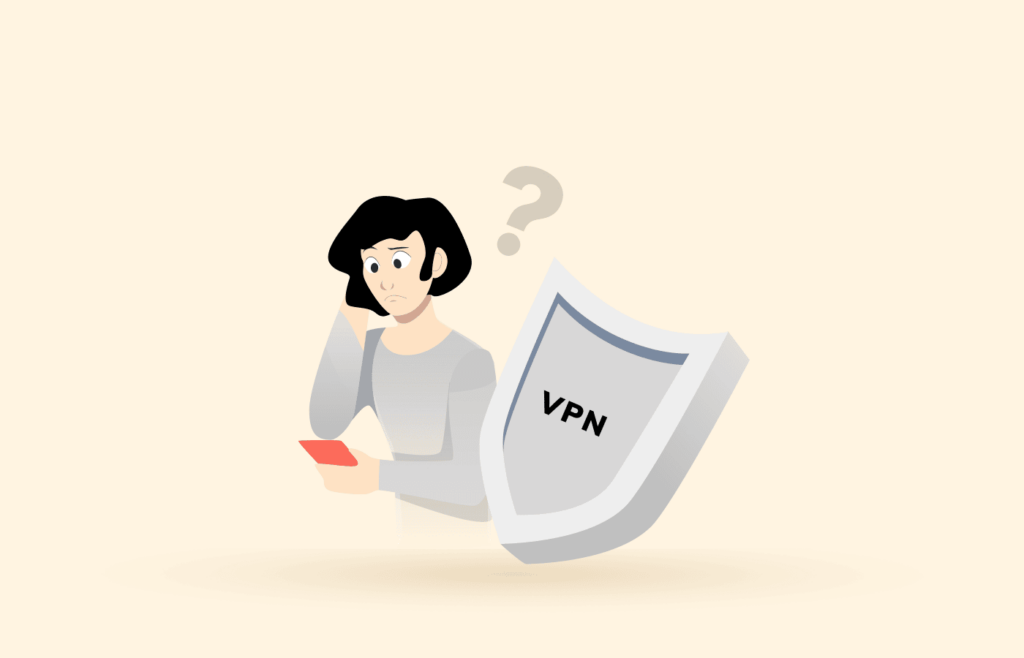
A VPN’s apps and clients are your gateways to the service. So, the app availability will influence your choice for sure.
This round is also for PIA. Its apps are more straightforward, user-friendly, and functional. It’s a good option for VPN newbies.
Desktop clients
The desktop software for both VPNs is remarkably similar. Both have a great big button to connect to the network and another window for the settings.
However, PIA’s clients are more convenient than ExpressVPN’s. Access to all kinds of helpful information is easier with them. They’re available for Linux, macOS, and Windows, offering split tunneling in every case. They are all more straightforward to use than their ExpressVPN counterparts.
Of course, there’s that slight problem with the Windows client lacking WireGuard support.
Mobile apps
The mobile versions are mainly just smaller versions of the desktop clients. Unfortunately, PIA’s iOS app doesn’t support split tunneling as we write this.
Both vendors support Android and iOS; the Android one is better.
And since both providers offer the same desktop software, with slight modifications to fit into phones and tablets, the pros and cons are the same. So, PIA comes out on top again because of its usability.
So, PIA takes the price for apps and clients.
Customer support

Both VPNs have sound customer support systems. Since both services are outstanding and the apps are easy to use, you shouldn’t frequently run into problems. However, if you do have an issue, the fundamental nature of a VPN service makes it imperative that you have a solution as soon as possible. Fortunately, both companies can give you that.
Both websites have vast knowledge bases, setup guides, FAQs, and many articles.
If you want to talk to another human being, you can raise an email ticket or have a live chat.
We tested both services, and they came out pretty even, so we will give them both a win in this case.
PIA vs. ExpressVPN: The verdict
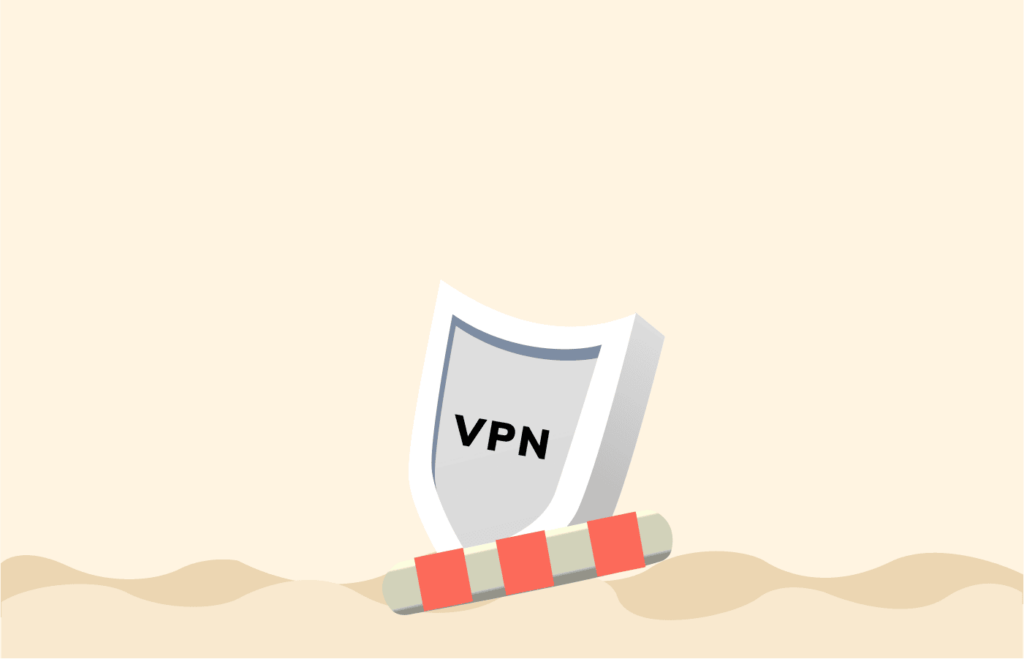
So, which VPN is the best? The question you should be asking is, instead, which VPN is the best for me?
When we look at both VPNs side by side, the first thing to notice is that they are both excellent. So unless you have a specific task in mind that needs the particular features of one of them, it’s fair to say that either service will do as a general-purpose VPN.
If you look closely at both, ExpressVPN is the better service. The quality it has in almost every regard is superior to PIA. But so are the prices.
So, PIA could be the better option for users who want a good VPN at an accessible cost. PIA will not give you the best of everything, as ExpressVPN could, but it’s affordable. On the other hand, if you really must have one of the industry’s top services and paying extra doesn’t trouble you, ExpressVPN would be the way to go.
Ultimately, the decision is yours. And now you have all the information you need to make it correctly.
FAQs
Yes, it meets all the standards a top-notch VPN should have. Encryption tunneling protocols, RAM-only servers, you name it. It’s even headquartered in one of the most privacy-friendly countries in the world.
Yes, it is. It has undergone several external audits, passing each with flying colors.
